Scolosaur, a free knitting pattern from Knitty.com. Free knitting pattern for a interestingly textured cowl knit from handspun yarn (commercial yarn alternative provided).
INTRODUCTION
Scolosaur
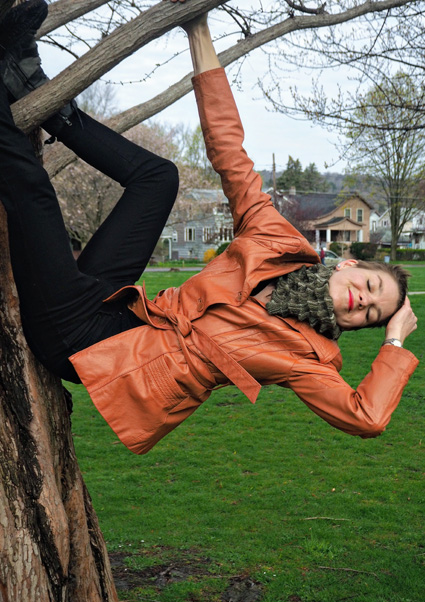 by Marcia Weinert
by Marcia Weinert
![]()
When fall comes along, those of us who live near the shores of Lake Ontario often wish we had scales like the ankylosaurus, only made of wool, to help fend off the brisk winds that seem determined to freeze our noses!
As part of its annual Roc Day celebration, the Black Sheep Handspinners Guild based in Ithaca, NY offered area spinners the opportunity to receive 3.5 oz/100 g of domestic Targhee top to spin any way they liked, without adding color or any other fibers, and invited them to craft their handspun yarn into a neck warmer or cowl for a “People's Choice” competition.
This spin-along challenge was announced just after I had broken my ankle. Perhaps I also hit my head when I fell, but I somehow got the idea that it would be difficult to spin while using only one foot. (Hullo? Even double-treadle wheels can be operated using just one foot, and I got plenty of spinning done while blockaded at home in a cast for six weeks!) In any case, I became determined to spin the very simplest and fastest possible yarn—i.e., unplied singles—and rely on an eye-catching stitch pattern, in order to stand out in the competition.
With some assistance from the interwebs, I stumbled across a very simple but highly-textured stitch pattern that is primarily formed of garter stitch, which offers the added benefit of balancing out the inevitable torqueing tendency of singles yarns. Ta-da!!! Armored scales to fight off the cold, and a 3-D texture worthy of Scolosaur, cousin to the Ankylosaurus: scales able even to cling to a frozen proboscis. (Bonus: Winner of the “People's Choice” award at the 2020 Roc Day gathering!)
Best of all, the project spins and knits up in a jiffy—and onlookers are bound to be intrigued by the textures emerging from your needles. ROOOOAR!!
 model: Sondra Wayman
model: Sondra Wayman
 photos: Matthew Hecking
photos: Matthew Hecking
SIZE
One
FINISHED MEASUREMENTS
Height: 7 inches/18 cm
Circumference: 22 inches/56 cm
MATERIALS
Fiber
White cowl [shown below]:
![]() Spunky Eclectic [Targhee wool; top] color: white, 3.5 oz/100g
Spunky Eclectic [Targhee wool; top] color: white, 3.5 oz/100g
Green cowl [shown above]:
![]() Into the Whirled [Targhee wool; top] color: Soylent, 4.0-4.3 oz/113-120 g
Into the Whirled [Targhee wool; top] color: Soylent, 4.0-4.3 oz/113-120 g
Note: 4 oz/113 g of Targhee top spun at 14 wpi (1600 yds per pound/3.150m per g) should provide enough yardage to work a cowl of 4 full pattern repeats (prov CO 85 sts) worked 11 times (24 inches/61 cm in circumference).
Finished Yarn
![]() Wraps per inch: 14 (finished singles/unplied yarn)
Wraps per inch: 14 (finished singles/unplied yarn)
![]() Ply: 1
Ply: 1
![]() Yardage used: approx. 250yd/228.5m
Yardage used: approx. 250yd/228.5m
![]() Drafting method: worsted
Drafting method: worsted
![]() Spinning tool: Majacraft Little Gem wheel with Low Speed Whorl, Scotch tension
Spinning tool: Majacraft Little Gem wheel with Low Speed Whorl, Scotch tension
![]() Ratio: 3.2:1
Ratio: 3.2:1
![]() Twist angle: 60 degrees
Twist angle: 60 degrees
Commercial Yarn Alternative
![]() Spun Right Round Merino Singles [100% Merino Wool; 400yd/366m per 3.5 oz/100 g skein]; color: Creature; 1 skein
Spun Right Round Merino Singles [100% Merino Wool; 400yd/366m per 3.5 oz/100 g skein]; color: Creature; 1 skein
Recommended needle size
[always use a needle size that gives you the gauge listed below - every knitter's gauge is unique]
![]() 1 set US #2/2.75mm needles for working flat
1 set US #2/2.75mm needles for working flat
Notions
![]() spare needle, the same size or smaller, for 3-needle bind off
spare needle, the same size or smaller, for 3-needle bind off
![]() 50 inches/130cm smooth sock-weight scrap yarn for provisional cast-on
50 inches/130cm smooth sock-weight scrap yarn for provisional cast-on
![]() crochet hook, any size, for provisional cast-on
crochet hook, any size, for provisional cast-on
![]() yarn needle
yarn needle
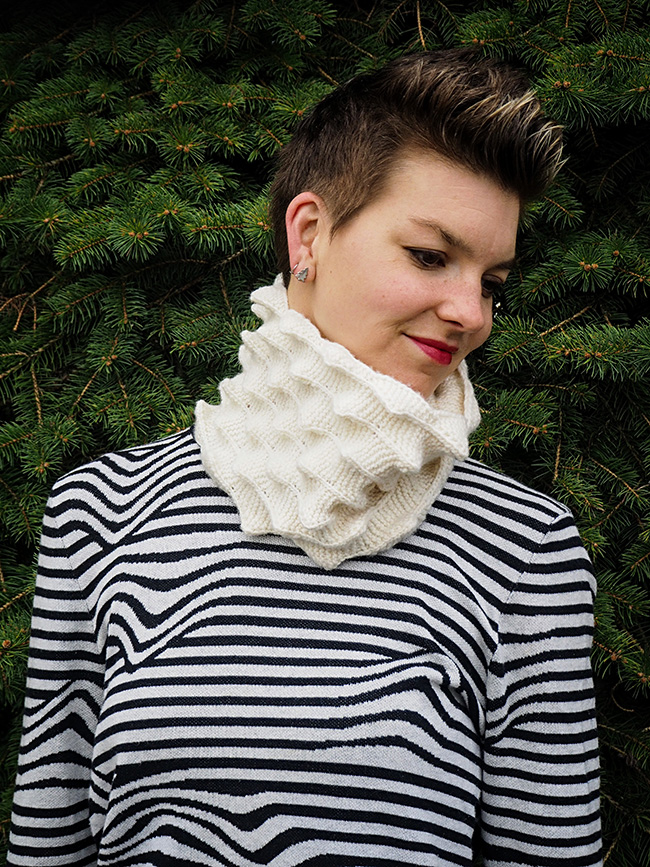
GAUGE
28 sts/38 rows = 4 inches/10 cm in stockinette stitch
36 sts/48 rows = 4 inches/10 cm in Scale Texture Pattern
PATTERN NOTES
[Knitty's list of standard abbreviations and techniques can be found here.]
Cowl is worked flat and joined with Three-Needle Bind Off.
Since singles yarn is inherently “energized,” spin with a very soft twist and wash to set the twist before beginning project.
The starting end of your singles yarn may want to untwist as you work the cowl. To prevent this, use your fingers to add extra twist to the first 8 inches/20cm of the yarn, and fold it in half on itself (like a “ply-back” sample), then tie a loose overhand knot at the base of the plied “tail.”
Changing Size:
To increase the height of the cowl, cast on additional multiples of 18 sts.
Each additional set of 18 sts adds 2 inches/5cm in depth to the cowl.
To increase the circumference of the cowl, work additional repeats of the Scale Texture Pattern.
Each additional repeat adds about 2 inches/5cm in circumference.
Techniques:
- Provisional CO: You can use whichever method you prefer. (There's a good tutorial here.)
- Three-Needle Bind Off: Hold both pieces of knitting with right sides together. Insert needle into first st on front needle and first st on back needle, and knit them together. *Repeat this for the next st on the front and back needles. Draw the first st worked over the second st. Repeat from * until all sts have been bound off. Break yarn and draw through remaining st.
M1: Make a backwards (e-wrap) loop and place it on the right needle; 1 st increased.
Slip 1: On both RS and WS rows, slip purlwise with yarn held to front of work.
Scale Texture Pattern
Worked over a multiple of 18 sts plus 11
Row 1 [RS]: Slip 1, k4, M1, k1, (M1, k7, S2KPO, k7, M1, k1) to last 5 sts, M1, k5.
Row 2 [WS]: Slip 1, k5, (p1, k8), to last 7 sts, p1, k6.
Row 3: Slip 1, k5, M1, k1, (M1, k7, S2KPO, k7, M1, k1) to last 6 sts, M1, k6.
Row 4: Slip 1, k6, (p1, k8), to last 8 sts, p1, k7.
Row 5: Slip 1, k6, M1, k1, (M1, k7, S2KPO, k7, M1, k1) to last 7 sts, M1, k7.
Row 6: Slip 1, k7, (p1, k8), to last 9 sts, p1, k8.
Row 7: Slip 1, k6, S2KPO, (k7, M1, K1, M1, k7, S2KPO) to last 7 sts, k7.
Row 8: Slip 1, k6, (p1, k8), to last 8 sts, p1, k7.
Row 9: Slip 1, k5, S2KPO, (k7, M1, K1, M1, k7, S2KPO) to last 6 sts, k6.
Row 10: Slip 1, k5, (p1, k8), to last 7 sts, p1, k6.
Row 11: Slip 1, k4, S2KPO, (k7, M1, K1, M1, k7, S2KPO) to last 5 sts, k5.
Row 12: Slip 1, k4, (p1, k8), to last 6 sts, p1, k5.
Row 13: Slip 1, k3, S2KPO, (k7, M1, K1, M1, k7, S2KPO) to last 4 sts, k4.
Row 14: Slip 1, k3, (p1, k8), to last 5 sts, p1, k4.
Row 15: Slip 1, k2, S2KPO, (k7, M1, K1, M1, k7, S2KPO) to last 3 sts, k3.
Row 16: Slip 1, k2, (p1, k8), to last 4 sts, p1, k3.
Row 17: Slip 1, k1, S2KPO, (k7, M1, K1, M1, k7, S2KPO) to last 2 sts, k2.
Row 18: Slip 1, k1, (p1, k8), to last 3 sts, p1, k2.
Row 19: Slip 1, k1, M1, k1, (M1, k7, S2KPO, k7, M1, k1) to last 2 sts, M1, k2.
Row 20: Slip 1, k2, (p1, k8), to last 4 sts, p1, k3.
Row 21: Slip 1, k2, M1, k1, (M1, k7, S2KPO, k7, M1, k1) to last 3 sts, M1, k3.
Row 22: Slip 1, k3, (p1, k8), to last 5 sts, p1, k4.
Row 23: Slip 1, k3, M1, k1, (M1, k7, S2KPO, k7, M1, k1) to last 4 sts, M1, k4.
Row 24: Slip 1, k4, (p1, k8), to last 6 sts, p1, k5.
CHARTS
Scale Texture Pattern
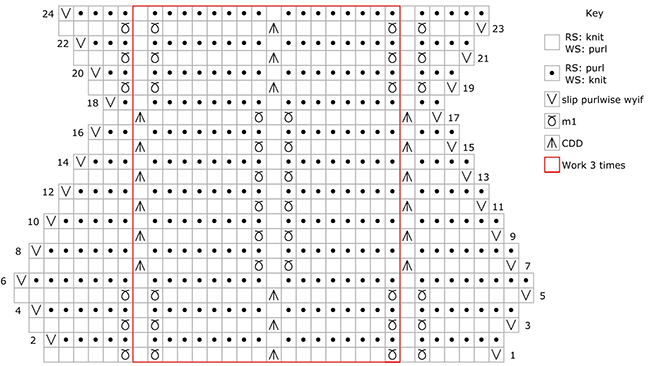
DIRECTIONS
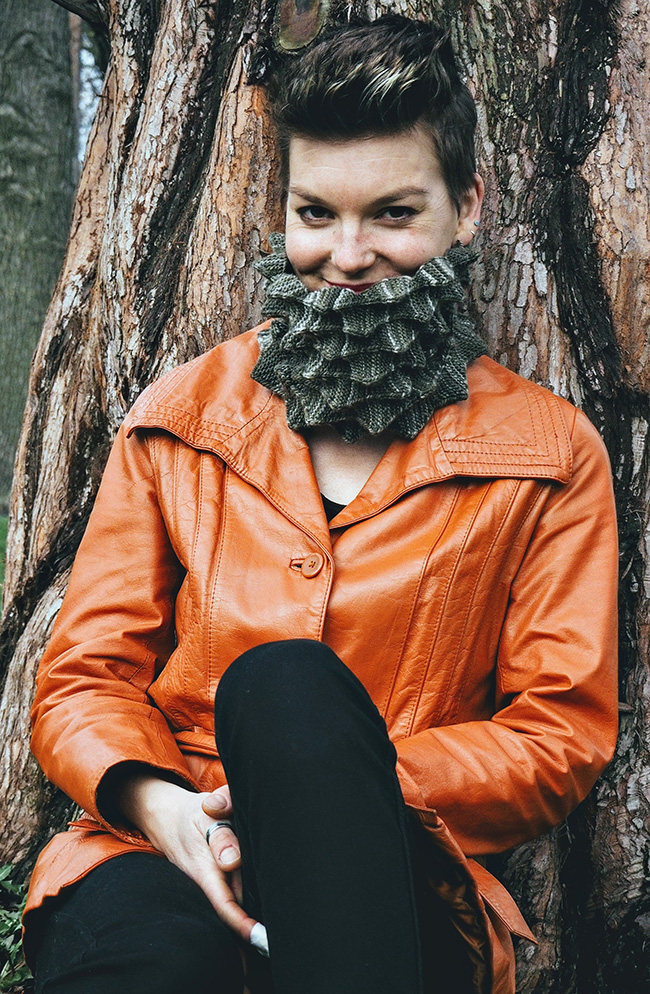
With scrap yarn, provisionally CO 67 sts.
Join working yarn.
Set-Up Row: Knit.
Work Rows 2-24 of Scale Texture Pattern, then work Rows 1-24 eight more times, then work Rows 1-22 once more.
Final Row: Slip 1, k1, M1, k2, M1, k1, (M1, k7, S2KPO, k7, M1, k1) to last 4 sts, M1, k2, M1, k2. 67 sts.
Remove provisional CO scrap yarn, returning resulting sts to your spare needle. With WS facing, work Three-Needle Bind Off across all stitches.
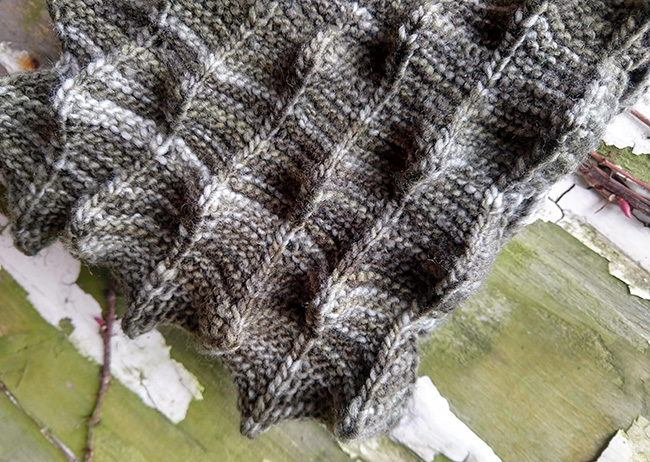
FINISHING
Weave in ends. Handwash to finish.
ABOUT THE DESIGNER
 Marcia Weinert has been addicted to turning fluff into stuff ever since sneaking her 9-year-old daughter's spindle and fiber after their first class together, over two decades ago! Her handspun skeins and original knitwear designs have taken top honors at some of America's largest festivals, and her patterns appear in print. She teaches spinning, knitting, felting, and crochet in many outlets across the northeast, particularly the Weaving & Fiber Arts Center in Rochester, NY. Special thanks to Donna Druchunas, and to Marcia's knitting circle of 16 years at the Webster Public Library, for their encouragement.
Marcia Weinert has been addicted to turning fluff into stuff ever since sneaking her 9-year-old daughter's spindle and fiber after their first class together, over two decades ago! Her handspun skeins and original knitwear designs have taken top honors at some of America's largest festivals, and her patterns appear in print. She teaches spinning, knitting, felting, and crochet in many outlets across the northeast, particularly the Weaving & Fiber Arts Center in Rochester, NY. Special thanks to Donna Druchunas, and to Marcia's knitting circle of 16 years at the Webster Public Library, for their encouragement.
Find her here on Ravelry.
Pattern & images © 2020 Marcia Weinert